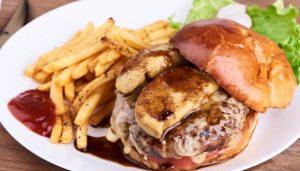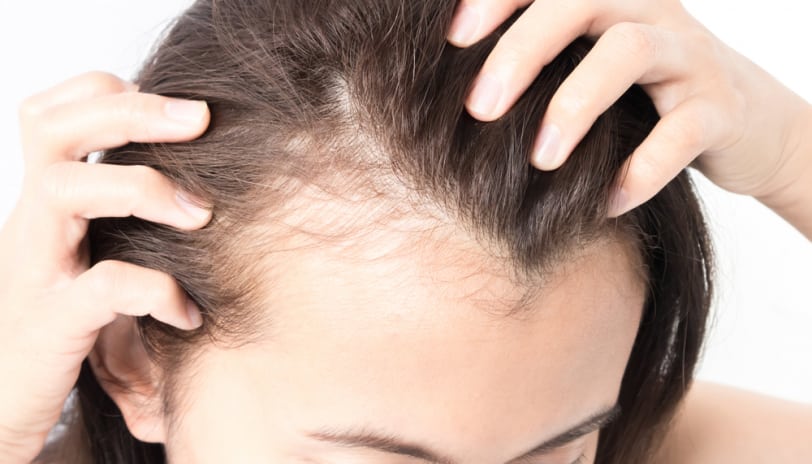Many people wish for thicker and fuller hair, especially when thinning hair becomes a noticeable issue as the scalp begins to show. Fortunately, there are natural treatments for thinning hair like balancing hormones, reducing stress levels, and eating a nutritious diet.
The average adult head has about 100,000 to 150,000 hairs and loses nearly 50 to 100 hairs each day. It sounds like a lot, right? But that hair loss is completely normal and won’t cause hair thinning. As long as hair regrowth and hair loss are in balance, hair thinning will not be a problem.
Due to conditions like hair thinning resulting from a traumatic event, getting your hair back on track takes some time and patience. If you are looking to thicken your hair, the following tips are great and natural treatments for thinning hair that will aid your hair growth.
1. Essential Oils
Rosemary is one of the top essential oils when it comes to enhancing hair thickness and growth. Rosemary oil is believed to increase cellular metabolism that stimulates hair growth. Research published in 2015 showed that rosemary oil appears to work as well as minoxidil, a conventional topical hair loss treatment.
Spikenard oil is known to encourage hair growth and lessen the graying process. A 2011 animal study found that spikenard oil had positive effects on hair growth activity. By using spikenard extract, there was a 30 percent reduction in the time it took hair to grow back on tested rats, ultimately making it promising for human use.
Peppermint oil and sage oil are also recommended to promote hair growth. Try mixing three to four drops of rosemary, peppermint, and sage oils into one tablespoon of olive oil or coconut oil. Then massage the mixture into the thinning areas once or twice a day.
2. Cooler Showers
Boston-based hair transplant surgeon, Dr. Ryan Welter warns that hot water can dehydrate hair strands, leading to dry, brittle hair that could snap and fall out. Lower temperatures on the hair (and skin) can help preserve moisture.
3. Shampoos and Conditioners
Using a natural shampoo and conditioner that includes biotin can help your hair, skin, and nails, as it is packed with vitamin B. According to studies, taking biotin internally can also help treat weak hair and nails.
4. Natural Supplements
According to the University of Maryland Medical Center, the following supplements can help with nutrient deficiencies, inflammation, and stress that can contribute to hair thinning:
- A multivitamin daily, containing the antioxidant vitamins A, C and E; B-complex vitamins; and trace minerals, such as magnesium, calcium, zinc, and selenium.
- Omega-3 fatty acids like fish oil; 1 to 2 capsules or 1 tablespoon of oil daily helps reduce inflammation.
- Vitamin C; 500-1,000 milligrams two times a day works as an antioxidant.
- L-lysine; 500-1,000 milligrams daily help hair loss.
- B-complex vitamins; 1 tablet daily helps reduce stress.
Bone broth or protein powder from bone broth is another great source for hair quality improvement. Bone broth is rich in protein, collagen, gelatin, glucosamine, chondroitin, and key minerals often missing from the average daily diet. These nutrients provide optimal support for hair health, as well as for skin and nails.
5. Foods That Hurt
To avoid hair thinning, you also might want to avoid certain foods like:
- Potential food allergens: If you eat foods that cause allergic reactions in your body, you can increase inflammation, which is not good for hair growth. Food allergens can include wheat (gluten), dairy, corn, soy, preservatives and food additives, depending on the person.
- Trans fatty acids: Trans fats have been linked to increased inflammation and production of DHT, which can cause hair loss. Avoid vegetable oil, corn oil, and soybean oil.
- Sugar: Sugar causes hormonal imbalances, increases DHT and causes inflammation, all of which lead to hair loss.
- Processed foods: Processed foods usually contain chemicals that disrupt hormone balance.
- Alcohol: Alcohol consumption increases inflammation and can cause liver damage and lead to hair loss.
- Caffeine: High levels of caffeine intake can cause dehydration, hormone imbalance, and production of DHT.

- Foods That Help
Increasing your intake of nutrient-rich whole foods in your daily diet can help with thin hair, as there is a strong link between what you eat and the health of your hair. Here are some of the best foods you can use as a natural treatment for hair thinning.
- Wild-caught, cold-water fish: Lean, anti-inflammatory protein in the form of wild-caught, cold-water fish like salmon is loaded with omega-3 fatty acids, which are an excellent natural treatment for hair health.
- Grass-fed beef: Hair follicles and roots are fed by a nutrient-rich blood supply. Having an iron deficiency can negatively impact the normal hair growth cycle and lead to the excessive shedding of hair.
- Iron-rich vegetables: Eating foods like lentils, kale, spinach and other leafy greens can significantly improve your iron levels.
- Vitamin C-rich produce: Getting enough vitamin C in your diet is essential due to its antioxidant properties. It also helps your body absorb the iron it needs. Vitamin C-rich foods include guava, red pepper, kiwi, papaya, and broccoli.
- Vitamin A-rich foods: Foods that are high in vitamin A can help maintain the overall health of your scalp, as it helps make the sebum that conditions the scalp. Some great choices are pumpkin, sweet potato, and kale.
- Biotin-rich foods: By consuming enough biotin, you can help prevent dry, brittle hair that is prone to thinning. Foods rich in biotin include nutritional yeast and egg yolks.
- Zinc-rich foods: Zinc is another nutrient that is key to overall hair health. Zinc is involved in tissue growth and repair, including hair. Foods high in zinc include grass-fed beef, pumpkin seeds, and chickpeas.
7. Balance Hormones
Balancing hormones can help with correcting thyroid health issues or other hormonally linked underlying causes of thinning hair. By eating right, avoiding certain foods, and exercising, you can help your hormones get back on track.
8. Reduce Stress
Reducing your daily stress level can have a direct impact on the health of your hair, as well as the entire body. By taking part in activities like journaling and yoga, you can de-stress naturally. Daily exercise is critical to stress reduction, as it also encourages blood circulation, which ultimately helps promote healthy hair growth.
9. Herbs
Saw palmetto extracts and supplements can be great for treating hair thinning because they keep testosterone levels balanced. Although there are mixed opinions regarding the use of saw palmetto for hair growth, studies have shown it is beneficial.
A study by the Clinical Research and Development Network in Colorado tested 34 men, and 28 women between the ages of 18 and 48 who applied saw palmetto extract in lotion and shampoo for three months. Results found that 35 percent of the participants had an increase in density.
Ginkgo biloba also helps strengthen the hair shaft. The herb also encourages blood flow and gives an antioxidant boost. When taken as an extract, you can try 40 to 80 milligrams three times a day.
10. Rule Out Medications
Keep an eye out for medications that may be causing hair thinning or even hair loss. Make sure you know the possible side effects of all your current medications as well as supplements.
(HealthiGuide)

